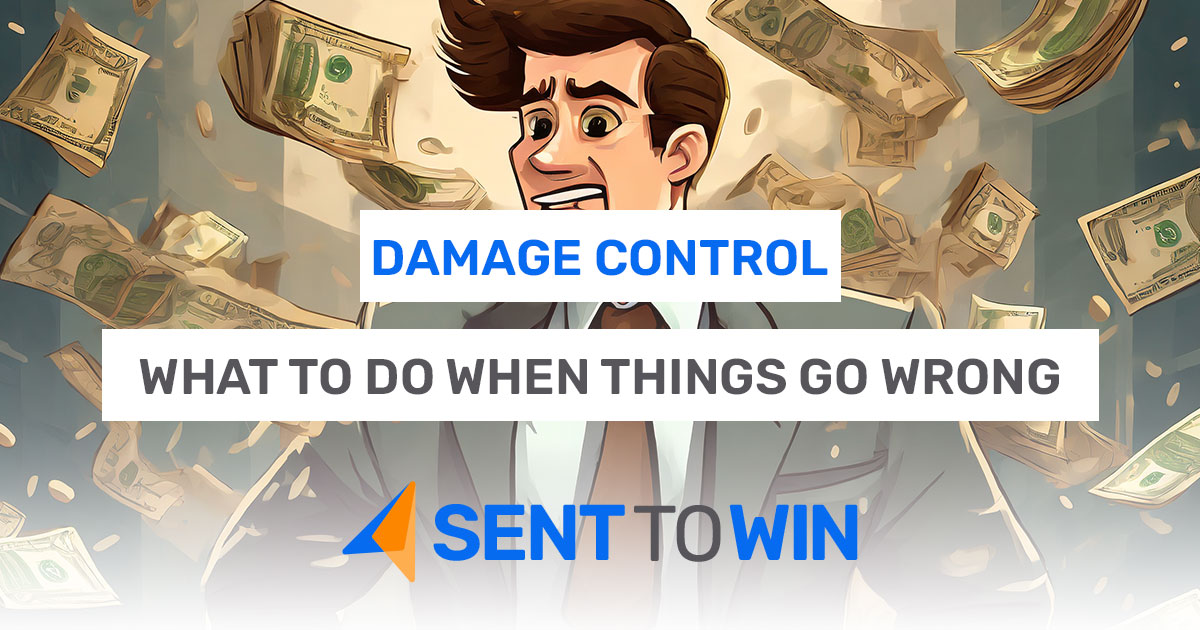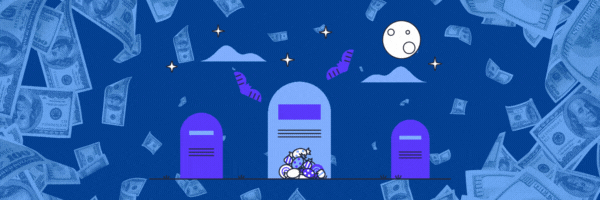Damage Control Bud Light vs. Liberty Safe – what to do when things go wrong
In today’s newsletter:
- Bud Light vs. Liberty Safe – what to do when things go wrong
- Layoffs, Halloween Green, and the Economics of Widening War
- How to Benefit from the Coming Recession
Everybody makes mistakes.
Often when we plan, however, we just assume that we aren’t going to do anything stupid, ever. One of the number one entrepreneur-killers is an overabundance of optimism, failure to prepare for an ugly scenario, because the truth is, every organization has a serious misstep now and then. If we take time to do a case study on companies who make a wrong turn, it can go a long way toward helping us plan for our own moments of crisis.
This past year, there were a few high-profile companies that made a horrible mistake, betraying consumer expectations. Some of these mistakes were just plain stupid – Target, for example, sold apparel and accessories that explicitly sexualized children, even employing a devil-worshipper as a designer.
Needless to say, the backlash was not great for them. Target’s primary constituency is suburban mothers, and they were obviously put off by the store’s actions. Shares of Target fell from a high of around $180 early this year to under $110 presently. Their market cap fell $40 billion. Not all of this was due to Target’s controversial pride collection, but about $30 billion of it was – Target’s stock price was above $160 when news of the controversy first broke out. All of this redounds to a loss of 40% of the company’s entire value this year, and as much as 75% of that drop is attributable to this single crisis.
Target pulled some of the more offensive articles, and they moved some items away from the front of the store, but they didn’t really earn a lot of customer confidence back. As a result, it’s been a bad year for Target.
So that’s an extreme case, but two other companies made big mistakes in the public eye this year, with ample opportunity to respond and recover. One company was Bud Light, and the other was Liberty Safe. Both organizations made brand-destroying decisions, but they responded in very different ways.
We all know about Bud Light. The former #1 beer fell from grace (and fell from #1) after partnering with transvestite influencer Dylan Mulvaney to promote their beer – despite the fact that their primary customer base is male, conservative, and rural. It went over like a lead balloon. Lifelong Bud drinkers swore off, switched brands, and even took firearms to cases of Bud Light to express their animus. Everyone thought it would blow over.
It didn’t blow over.
Months after the fact, we have seen sales drops of up to 42% in some cities, Bud Light giving away cases of beer for free in order to try and shore up dismal 4th of July sales figures, and Anheuser-Busch, the parent company, losing billions in valuation as their revenue dropped by hundreds of millions of dollars. They even had to sell off 8 popular brands of beer, such as Shock Top, in order to stem the losses.
Then you have Liberty Safe, a gun safe manufacturer, who made a big mistake at the beginning of September. A January 6er’s house was raided by the FBI, who had obtained a warrant to search his home. The FBI found a liberty safe, and so they called the company, who immediately handed the feds an override code to break into the safe and confiscate the man’s guns.
Now, the people who buy gun safes tend to be, as you might imagine, very 2nd amendment friendly and generally suspicious of the government. Liberty was under no legal obligation to hand over the code, and their customers were immediately up in arms, with big names in conservative media, such as the Hodge Twins and Charlie Kirk, condemning the company.
I called a large Liberty Safe dealer and distributer, however, as well as a representative from the manufacturer itself, and they report that they’re doing just fine. Safes are on backorder. There was a short “divot” in sales and about two weeks of fielding angry phone calls, but then it died down, and people moved on. Many of the gun enthusiasts we spoke to don’t even remember the issue at all. Sales are back up, and Liberty Safe, one of the largest gun safe manufacturers in the country, is still comfortably on top of the industry.
So why the difference in outcomes? Both Bud Light and Liberty Safe made some pretty big errors in branding and consumer trust. Bud Light has presented itself as a tough, patriotic, traditional man’s beer for decades, and then suddenly there’s a drag queen on the can. Liberty Safe sells the notion of security, privacy, and protection, and they sold out a customer without hesitation. But the ways they responded differed greatly.
Bud Light, for its part, would not apologize – but they would not double down, either. So after a few milquetoast “apologies” from executives (which never admitted wrong or actually apologized, merely affirming that their beer is for everyone, pleading with consumers to stop being mad), traditional customers got angry. What’s more, LGBT-aligned customers got angry because they felt that Bud Light shouldn’t have released any form of apology at all. So country bars dropped Bud Light at the same time gay bars dropped it. Bud’s solution, when everyone just wanted them to take a side and bring some clarity? Pandering, confusing ad-buys on television. First, they tried the ol’ Clydesdales and America schtick, which did not go well. It felt shallow, and people were insulted at the overt attempt to paper over the crisis. Then, they released a confusing attempt at comedy that depicted Bud Light drinkers as bumbling idiots. Customers didn’t like that very much either. Then, finally, Bud Light tried to stand on the graves of dead soldiers, in a campaign that felt like pressuring people into buying their product because they had donated money to a charity that supports military families.
All the while, Bud Light still sponsored pride parades around the US and Canada, and wondered why no one was buying their beer at baseball games.
Liberty Safe, on the other hand, leaped into action.
They released a statement that explained the reason they complied with law enforcement’s request, but also expressed genuine understanding and sympathy for offended customers. They backed that up with action – immediately putting a new feature on their website that allows consumers to delete record of their safe’s override code from Liberty Safe entirely. They explained that the reason for having override codes in the first place, an industry-wide standard practice, was to assist customers who had forgotten their safe’s code (which happens a lot). Finally, they changed their company policy to ensure that no one at their organization would assist anyone in law enforcement with opening one of their safes unless they received a subpoena or warrant directly against Liberty Safe itself.
Then, they got all of their distributors on message, centralized complaint-taking and customer service, and laid low for a while.
Bud Light, on the other hand, doesn’t know what the phrase “lay low” means. They’ve tried branding stunt after branding stunt in a desperate attempt to avoid the one thing that people actually want from them: a real apology.
This past week, Dana White announced a 6-year partnership with Bud Light as the official beer of the UFC, promising that the brand will be highly visible during weigh-ins, fights, and online digital content. The question remains, then, if UFC’s trad credibility will spread back to Bud Light, or if Bud Light has become a poison pill that will cause UFC to take it on the chin.
We’ll have to wait and see, but One Fighting Championship is probably very excited by the news.
TL;DR
When things go wrong, address the problem quickly, directly, and give the people what they want. Have enough humility to lay low for a while after that, express sympathy with your customer’s grievances, and focus on your core business.
INDUSTRY INSIGHTS
Layoffs, Halloween Green, and the Economics of Widening War
Layoffs
A far-reaching new round of layoffs has hit corporate America hard this past week and in recent months. In the tech industry alone, there have been a quarter million positions eliminated in 2023. It isn’t just tech, however. Farmers Insurance has laid off 11% of its workforce, and Geico let 6% of its workforce go – a combined total of 4,400 jobs between just those two companies. Media has also been affected, with the Washington Post removing nearly 10% of its workforce, Barstool sports cutting 25% of its staff, and Buzzfeed has eliminated its news division entirely. Disney, NPR, McKinsey, and many other recognizable organizations have let large numbers of employees go this year as well, and when paired with a widespread inventory stock-up, some commentators have speculated that savvy corporations are getting ready for difficult economic times.
Halloween Green
Halloween continues its ascendency in the consumer market, as 2023 is projected to set another record this year. The National Retail Federation estimates that Americans have spent $12.2 billion on the spooky October holiday this year, breaking the previous record set in 2022 of $10.6 billion. Inflation is responsible for part of the increase, as candy and gum prices are up 7.5% compared with September of last year. The number of people who celebrate Halloween is on the rise as well, as an estimated 73% of Americans partook in the festivities this year, another record high. Surprisingly, of the $4.1 billion spent on costumes, only 1/3 of that was for children, with fully $2 billion being spent on adult costumes, and around $700 million dollars on pet costumes. The top costume choices for adults? Witches, Vampires, and Barbies.
The Economics of Widening War
As the war in Israel intensifies, and the ground invasion into Gaza has now begun, Israel has also struck at Iranian-backed terrorist targets in Lebannon and Syria, stoking international fears that Iran may enter the conflict directly, instead of attacking only via its proxies such as Hezbollah. From an economics perspective, a widening of the war would likely drive up energy costs, disrupt important trade routes, and drive global demand downward. Higher energy prices would translate to an increase in the cost of food and industrial metals, but U.S. oil production is up, a trend that, if continued, could help to shield the domestic economy to some extent.
Sunday School
Q. What is the longest book in the Bible?
A. If you said “Psalms,” you are incorrect! Psalms has the largest number of chapters, but it is actually the third longest book in the Bible, at 30, 147 words. Jeremiah (33,002 words) and Genesis (32,046 words) have it beat. Jeremiah, then, is the longest book in the Bible.
TIPS & TRICKS

“Hold for 3 years? Dave, I don’t even buy green bananas anymore.”
How to Benefit from the Coming Recession
Don’t let the happy talk fool you.
The soft landing is, at this point, likely a myth. The pressure on the economy is unsustainable, and what goes up must come down. The inflation rate has slowed, but we still have to deal with the consequences of a year of currency debasement, weakening credit ratings, elevated production costs in some industries, unprecedented consumer debt – and all that loose money moving into the economy via consumer spending is about to dry up. The stock market slide may already be in its beginning stages, and by some accounts, housing is stagnating. If you put stock in Jeremy Grantham’s analysis, the commodities market may even be experiencing a bubble soon to burst.
And China could collapse, which would kick all of this into action rather quickly.
But this isn’t a doom and gloom piece. It’s a look on the bright side piece. A lot of people made their money during the Great Depression. Clever investors know how to capitalize on a down economy, but that requires looking at what’s ahead with sobriety, strategy, and a little bit of chutzpa.
“Buy low, sell high,” is the fundamental law of arbitrage, and nothing offers low prices like an economic setback. In order to make the most of a bad situation, you need to do three things with your business and/or investments:
Step 1: Get Lean
The lead up to a recession is the time to ruthlessly eliminate waste and cut costs. If you are overextended, you could land in a bad situation. Any unnecessary expenses have to go. Anything you can do to increase efficiency needs to be done. Pay off high-interest debt, bring in new revenue, and batten the hatches, even while you carry on with the daily work.
This is all, hopefully, standard advice. What we do not always consider, however, is that some sources of revenue are more resistant to recession than others. Some revenue streams even improve in a recession. For example, residential remodeling will likely slow down significantly in a bad economy, but HVAC repair will be unaffected. Customers can put off redoing the bathroom for a couple of years when money is tight, but when the A/C goes out in August, they’ll find a way. This is why developers and remodelers can get hit hard in a recession, but other segments of construction, such as electric and plumbing, are largely unaffected.
In general, repurposing, repair, and cost-saving products and services do well in a recession. If your business contains an aspect that is recession-proof, make sure you are able to scale it up when necessary.
Step 2: Beef Up Your Reserves
Most people do not plan for the downturns, so when stocks, real estate, and other investments are at their most affordable, they are not in a position to buy. Whatever your normal reserve level is, consider increasing it. People who are already extended tend to do poorly in a recession. People who are coiled and ready to pounce (and hold, for a couple of years) do very well. Make sure you have some liquidity and can handle shocks to your business, and be ready to buy when things bottom out.
Liquidity dries up in a recession, unless you are willing to get creative. Banks tighten lending (they have already begun doing so), but alternative sources of capital exist if you have the relationships or know-how to take advantage. Venture capital, angel investors, peer to peer loans, and crowdfunding are options that may be worth looking into.
Step 3: Capitalize on the Dip
This will look different depending on what industry you are in, or what your investments consist of. If you are in real estate, a credit crunch means short sales, which can be lucrative. If you’re playing the market, make smart picks on durable blue chips and buy when the sell-off reaches its climax. Heck, go to the pawn shop or scour Facebook Marketplace and buy undervalued consumer goods that people are trying to sell in a hurry, or attend liquidation events and estate auctions.
Whatever your strategy is, it’s going to require that you have liquid capital while others don’t, and that you have the staying power to hold for a little while. If you can be prepared for the storm, it’ll fill your reservoir for years to come. If you aren’t prepared… Well, then it’s just a flood, and you’ll have to do your best to swim.
Quick Hits
- A recent study from the Texas Public Policy Foundation reveals the true cost of owning an electric vehicle to be the equivalent of paying $17/gallon.
- Mike Johnson, a staunch Louisiana conservative, has been elected as Speaker of the House.
- General Motors has reached a tentative agreement with the United Auto Workers.
- TGC’s Pastor Brandon Levering encourages churches to engage on difficult cultural issues.
- Homeschooling continues to experience explosive growth, even after public schools have long since returned to pre-COVID policies.
Guess the Prompt
Our “Damage Control” graphic was generated using AI prompts. Guess the prompt for your chance to win Sent To Win gear. Just reply to this email with your best guess.
For Kingdom Leaders, By Kingdom Leaders
Bringing Kingdom-minded leaders like you fresh perspectives and insights on business, finance, and leadership trends.








